
INDIA-EU
|
Bomb scare hits Eiffel tower, Paris metro stationPARIS, Sept 14: Two anonymous calls put the iconic Eiffel Tower and a metro station on bomb alert here on Tuesday evening. Police evacuated tourists from the Eiffel Tower before launching search operations, but no explosives were found. "Special units were on site and have inspected the entire structure and nothing was found. About 2,000 people were evacuated from the perimeter," the spokesman said, informing that the company that operates the Eiffel Tower received an anonymous call around 8:30 pm (local time) saying a bomb had been planted there. The second anonymous call led to a bomb scare at the Saint-Michel metro station, which was the site of a July 1995 bomb blast in which eight were killed and over 80 injured. Police evacuated the metro station briefly but found no explosives. France has been on high alert as the senate on Tuesday voted to ban the wearing of the Muslim veil, the burqa or niqab. The ban has incurred the wrath of radical Islamist groups. EU commits itself to full opennes for Indian investmentBy Deepak Arora NEW DELHI, July 23: The European Union has committed itself to full openness towards Indian investments and is looking forward to integrating both investment liberalization and investment protection in its negotiations with India to make the EU-India FTA more comprehensive, balanced, ambitious and useful for both EU and Indian investors, Ms. Daniele Smadja, Head of the Delegation of the European Union to India, declared here on Friday. France, he said, had introduced a new visa system for business which gives them the privilege to reside in France easily. Mr. Bonnafont said that over 750 French companies were registered in India against only 90 Indian companies in France. He sought a far greater involvement of more Indian companies in his country. French National Day celebrated in DelhiTop French honours for Mushirul Hasan, V K TewariBy Deepak Arora Pix By Noyanika Arora
Prof Mushirul Hasan is a historian and the Director General of the National Archives of India and a former vice chancellor of Jamia Millia Islamia. He has embarked on a mammoth exercise to digitize rare documents and restore old ones at the National Archives.
Hasan has published several scholarly books, edited many works on Islam in India and authored numerous articles on post-independence India. He has also been part of government-sponsored delegations sent on international missions. Hasan has delivered lectures at countless international conferences, and taught in various international universities and institutions, including Maison des Sciences de l’Homme, Centre d’Etudes de l’Inde et de l’Asie du Sud, International Institute of Languages and Civilisations (INALCO), all in Paris.
Among various honours, Prof Hasan was conferred the Padma Shri by President APJ Abdul Kalam in 2007. Prof Vinay Kumar Tewari, former Vice-Chancellor of Uttarakhand Technical University, is professor of metallurgical and material sciences at IIT Rourkee. He has been member of many national committees and is the Founder-Coordinator of the Centre for Corrosion and Protection sanctioned by the Ministry of Human Resource Development. Glimpses of the Investiture Ceremony
His academic experience in European countries includes France, Belgium, UK, Holland and Germany. He has published extensively, taught and developed courses, and made short films in his area of specialisation. He has been instrumental in setting up many collaborative projects between France and India. He was part of the team of Indian delegation of VCs and IIT directors who visited Nice and Paris in Sept 2006 for the Indo-French cluster meet that resulted in the creation of the Indo-French consortium of Universities. Among others, Prof Tewari was awarded the Uttaranchal Ratan award in 2005. French National Day celebrations
The Minister of State, Planning and Parliamentary Affairs V Narayanasamy was the chief guest. The other eminent persons those who attended the French National Day reception included Member of Parliament Tarlochan Singh, National Human Rights Commission Chairperson KG Balakrishnan and noted peace activist and grandson of Mahatma Gandhi, Rajmohan Gandhi.
Some of the Ambassadors who graced the occasion included Kazakhstan Ambassador Doulat Kuanyshev, Philippines Ambassador Ronald B. Allarey, Bhutanese Ambassador V Namgyel, Burundi Ambassador Rubuka Aloys, Italian ambassador Roberto Toscano and Macedonian ambassador Peter Jovanovski.
The French national day which is also referred to as the Bastille feast marks the storming of the Bastille in 1789 which is viewed symbolically as the birth of the modern French republic. French National Day Celebrations
French National Day Celebrations
India, Brazil, Germany, Japan must get permanent U.N. seats: French Ambassador Bonnafont
“How can such a body pretend to solve problems when India, Brazil, Germany and Japan are not sitting at the table,” Mr. Bonnafont asked at a meeting at the University of Madras. Speaking on the eve of Bastille Day or La Fete Nationale (July 14) commemorating the start of the French Revolution, Mr. Bonnafont said India and France shared the ideals of liberty, equality and fraternity and an unconditional desire for peace. The two also believed in the United Nations as a parliament of nations and in finding solutions to the world's problems through mutual dialogue. It was natural then that France supported India's bid for a permanent seat in the Security Council, he said. Addressing students, Mr. Bonnafont said the next generation would face the problems of ensuring sustainable economic development and maintaining global peace. “The biggest challenge you have to confront is the ecological challenge,” he said. “How do you allow each person to pursue what he wants without damaging the ecology? This requires expertise from politics, economics, biology and other fields. Clearly the recipes of the West are not sufficient and we need to combine the knowledge of Europe with ideas from Asia, Africa and other regions.” While “nothing justifies terrorism,” Mr. Bonnafont said there was still the need to address concerns that were being used as pretexts by terrorists. Among these were the bringing of peace to troubled parts of the world such as Afghanistan and bringing economic development to backward regions. Science and technology could be used for good or for bad and it was up to universities to provide a moral education along with the imparting of knowledge to create a peaceful society, he said. The ambassador praised the recently concluded World Classical Tamil meet, saying that it was important for nations to hold firm to their cultural identities in the era of globalisation. On the controversy about the wearing of the veil by communities in France, Mr. Bonnafont said the idea of secularism demanded that such beliefs were not brought to the public sphere. He said parents were free to send their children to private schools and individuals were free once they reached adulthood to choose to wear the veil. But the government would not allow it in public schools for children. At the same time, the burqa and the hijab were being banned because they were offensive to the dignity of women. He called India a “metaphor for globalisation” on how people with different languages, religions and political ideas could live together peacefully. President Nicolas Sarkozy's scheduled visit in December would further strengthen the ties between the two countries, he said. Vice-chancellor G. Thiruvasagam presented a set of twelve volumes of the English translation of Chief Minister M. Karunanidhi's works. He talked about the close association of the University with France and called for further development of ties. Mr. Bonnafont also presented the Officier des Palmes Academiques to Hema Parthasarathy, head, Translation and Interpretation Cell, Alliance Francaise, Chennai, and the Chevalier des Palmes Academiques to Chitra Krishnan, head of the French and Foreign Languages department, University of Madras, for their contribution to the promotion of the French language. Organised on the eve of the French National Day which commemorates the storming of the Bastille prison marking the beginning of the French revolution, the event saw ambassador Bonnafont announce that the award went to people who had dedicated their lives to studying and teaching French. "Normally, the French government gives out these awards when people retire. Hopefully, it is a new trend that they are recognising us while we are still working. It gives us motivation and impetus to carry on doing our best," said Chitra Krishnan after the award ceremony. While she has written several books that are aimed at learning French effectively, professor Krishnan has also edited a collection of French short stories which documents the oral tradition of short stories from around the world. "In English, the title means, ‘By word of mouth'. I got people to send me their favourite folk tales which were passed on to them orally," she added. Her fellow awardee Hema Parthasarathy said she was grateful to her colleagues at AFM and also Vidya Mandir Senior Secondary School for giving her the opportunity to pursue an MA in French from AFM and then eventually migrate to the institute to work with them. "I have been teaching French at Alliance Francaise for the last 28 years. I was a student counsellor and a course co-ordinator. I am handling only the translation cell now. As there is no retirement age for teachers, I am still doing what I like best which is teaching French," she said. "Since the heads of the institute keep changing every four years, it is we Indians who have to keep the continuity in place. We are the link between the years," Hema Parthasarathy added. India Ahead of China in 'Total' Growth: Guy SormanBy Deepak Arora
Guy Sorman was speaking after release of his book “Economics Does Not Lie” by Dr M S Swaminathan at the residence of the French Ambassador, Jerome Bonnafont. Sorman said though India is referred to as the second fastest growing economy in the world after China, but for him India is Number One if one takes in account other parameters such as personal freedom, democracy ie freedom of choice, right to express oneself and right to express ones religion.
“And when I say this I don’t have two languages. I say this in China too.” Speaking on the occasion, French Ambassador Jerome Bonnafont said Sorman had predicted three decades ago that Green revolution and empowerment of the people and improvement of the system would trigger huge economic growth in India. And today it has come true.
Sorman said “Given the market crisis, economic fundamentals have become all the more crucial for us and its significance is evident in every sphere. Before pointing fingers at the free market revolution, policy makers need to keep in mind its benefits.”
Upholding the free market system, Guy Sorman in the book acknowledges its cyclical downturns, but says that these are due to uncontrolled innovation - a defect in the system, not a failure of the system. In fact, opening economies and promoting trade helped reconstruct Eastern Europe after 1990 and lifted 800 million people out of poverty across the globe. In Economics Does Not Lie, Guy Sorman shows that behind this unprecedented growth there is not only the collapse of State socialism but also a scientific revolution in Economics - one that is, so far, dimly understood by the public but increasingly embraced by policy makers around the world.
Twenty five years ago Sorman had predicted that India was a promising country and it is not in India’s destiny to stay poor. In spite of several crises in the past 45 years, India has made huge progress not only in economical growth but also in human, ethical and cultural terms. “India has shown that if the right institutions are built and people are given right to work, a nation can make huge strides in growth.”
To further emphasize his belief in free market, he said at the recent G20 Summit at Toronto no government proposed an alternative to free market. Sorman said he is committed to free market as it helps improve the lives of the poor people, including women.
Speaking on the occasion, Gurcharan Das said Sorman reminds us that Chile under the dictator, Pinochet, developed faster than its democratic Latin American neighbours, authoritarian China is outperforming liberal India, Japan and Korea took off under authoritarian regimes, imperial Germany progressed just as rapidly as parliamentary England or republican France in the nineteenth century. Today, however, he said democratic India, South Africa and Brazil have taken off. “Democracy does exact a price by slowing the economic growth rate but eventually good policies, which reinforce the institutions of capitalism mentioned above, allow a democracy to take off,” said Gurcharan Das.
Speaking on the occasion, Shekhar Malhotra, Director, Full Circle, publisher of the book, said Sorman’s ability to simplify the complexity of economy makes his work interesting. The book will prove valuable insights into the free market system in context of the current economic crisis.
Guy Sorman is a French journalist, economist, philosopher and author. He has authored over 20 books on contemporary affairs, covering the five continents, focusing on the ideals of creativity and modern capitalism. He has held several public offices, including advisor to the Prime Minister of France (1995-97) and global advisor to the President of South Korea. His previous books by Full Circle include The Genius of India (2009) and America: In Pursuit of Happiness (2008). Full Circle publishes books on inspirational subjects, religion, philosophy and natural health. The objective is to help make an attitudinal shift towards a more peaceful, loving, non-combative, non-threatening, compassionate and healing world. Belgium assumes EU presidencyBRUSSELS, July 1: Belgium has formally taken over the European Union's six-month rotating presidency from Spain, promising to deal with the EU's economic troubles. A founding EU member state, Belgium has held the presidency 12 times, the EUobserver reported Friday. The country says it can handle crises like the economic woes currently besetting Greece and other EU countries. "September 11th (2001) took place under our last watch," said one senior finance official. "I think we can say we know how to deal with crises." Belgian diplomats will have a chance to prove they can handle conflict by brokering agreements between member states and the European Parliament on the EU's financial supervisory package -- the bloc's principle legislative response to the economic crisis -- the report said. Since the measures were announced in September, member states have tried to weaken them while the European Parliament wants to toughen them up before the Jan. 1, 2011, deadline for setting up the new supervisory bodies, the EUobserver said. Belgian Foreign Minister Steven Vanackere said his country was ready to take the lead on the issue. "We intend to work a lot with the European Parliament," he said. EU keen on closer security ties with India
In an attempt to give a strategic dimension to the partnership, Ms. Ashton termed counter-terrorism a “significant feature of EU-India security cooperation,” with both sides discussing the progress on cooperation between the European Police Office and India. In discussions with National Security Advisor Shiv Shankar Menon, Ms. Ashton touched upon the possibility of India joining the “fusion centres” in which all the relevant organisations and agencies interact. The EU official felt exchange of intelligence and face-to-face meetings had become more important in the light of U.S. President Barak Obama's intention of reducing forces in Afghanistan from next year. She cited the September 11, 2001 attacks when most of the information necessary to forestall the attack was available in the security, intelligence and law enforcement systems but was not properly put together to allow the full picture to be seen. In anti-piracy operations, a working relationship has been established between the EU Naval Force and India to facilitate the programming of patrols and escorts, she said. During her meetings with Prime Minister Manmohan Singh and External Affairs Minister S.M. Krishna, the EU official appreciated India's rebuilding and capacity enhancement efforts in Afghanistan. It mirrored what the EU was attempting to do. “We would also like to deepen the dialogue we have with India on regional issues, including on Afghanistan, Pakistan and Sri Lanka. We recognise the efforts made to have channels of communication open between India and Pakistan,'' she said. Ms. Ashton discussed with Minister for Overseas Affairs Vayalar Ravi the migration of Indians to the EU and the prospect of a labour mobility pact that will set out the areas of cooperation in labour market expansion, employment facilitation, orderly migration, exchange of information and cooperation in introducing best practices. France launches CSR dialogue with IndiaBy Deepak Arora
Ambassador Doucin responsibility involves proposing dialogue of European counties with the emerging countries like India, China and Brazil on CSR
However, he said the private sector is playing a big role in CSR in Europe. He said 29 multi-national companies like Carrefour, Wal-Mart have taken initiative by themselves in the direction of Corporate Social Responsibility. While Dr Abid Hussain moderated the seminar, others who participated included Parul Soni of Ernst & Young, Amit Kaushik, COO of Pratham and S Ramakrishna, Executive Director, Corporate Affairs, Caterpillar.
Soni said until 1992, the companies followed the charity approach without concrete or long-term engagement. They established trusts, training and scientific institutes, hospitals, schools and temples to share its wealth with the people. However, between 1992 and 2000, he said there has been increased awareness and stakeholder participation in CSR, compliance, goodwill etc following the international models.
He said in India most of the companies go for education and health related projects. Only 11 per cent of went for CSR disclosures and most Indian companies were at Stage 1 and Stage 2. Explaining further, he said Stage 1 is exploratory where companies gain knowledge, undertake token projects, and follow philanthropy with the help of voluntary employees. In the Stage 2 there is risk mitigation where companies comply towards emission levels and resettlement and rehabilitation, go for green and ethical supply chain and energy efficient technology.
Former Ambassador of India to the US, Dr Abid Hussain, said though India entered late in the CSR scenario as seen by the West, she has been following the idea of inclusive development with the cooperation of the Government, non-governmental organizations (NGOs) and civilian actors. He said the CSR helps in development of human forces providing benefits for the last man. He said we can get much more enlightenment from Europe in the CSR and enrich each other. Quoting from Indian scripture of Mahabharata, Ambassador Hussain said it teaches us the way of Dharma (Truth, rightful way of living), Artha (economic activity along with charity), Karma and Moksha. “One can combine rightful way of life to earning or doing business,” he added. Amit Kaushik, COO of Pratham, a NGO, said the whole debate on the CSR is in early stages in India. Shareholders, who hold the stake, are not aware of their rights. Only management or a few executives take decisions with regard to CSR. Kaushik said in India the family-owned businesses followed CSR as a matter of charity for temples or setting up educational institutes through the family-owned Trusts or Charity organizations. This approach needs to change, he added. S Ramakrishna, Vice Chairman, Caterpillar, said some of the Indian companies like Tatas have been following the principles of CSR since its inception. Tatas have been building schools and roads and planting trees when such concepts of CSRs were unheard of.
Making a statement during the question answer session, Yogesh Kochhar, Director (Business Development), Microsoft, said for the CSR to succeed in India, we need four things – inclusive education, inclusive health, financial inclusiveness and market inclusiveness. The only way to go forward is through Information Technology. He said for e-governance to happen we need to connect people through computers for fast decision making and fast dissemination of knowledge. Mangalore crash: Sarkozy conveys condolences to PM
"As India is struck by an air tragedy near Mangalore, in the state of Karnataka, I wish to convey to you my great sadness and to offer my most sincere condolences in the name of the French people and in my own name," Sarkozy said in a letter to the Prime Minister. "My thoughts also go to the families of the deceased. I would be very grateful to you for conveying to them the solidarity of France in this painful ordeal," he added. In his message to External Affairs Minister S M Krishna, the French Minister of Foreign and European Affairs Bernard Kouchner said, "I wish to offer my sincere condolences, along with all members of the government. In this ordeal, Ishare in the sorrow of the families of the victims." The Air India Boeing 737-800 plane on way to Mangalore from Dubai overshot the runway and crashed at the Mangalore airport in Karnataka on Saturday, killing 158 people in the first major plane crash in India since 2000. AFD signs pacts with SIDBI to promote energy saving investmentsBy Deepak Arora
An agreement to this effect was signed here on Friday between AFD and SIDBI. The two sides also signed a 0.5 million-Euro technical assistance grant deal.
Speaking on the occasion, the French Ambassador said France wants to contribute and support the Indian Government’s strategies for climate change and poverty alleviation. Ambassador Jérôme Bonnafont said India was on the move and is showing impressive growth. India is also adapting to newer technologies. France would like to be privilege partner of India in this, he added.
She said this financing aims to reduce their energy bills, improve their efficiency and enhance their competitiveness. The AFD project will combine a cluster approach, especially in energy intensive sectors such as foundry, textile, leather, ceramics, food processing etc and a technology approach based on energy efficiency equipments for plants and machineries.
Mr R M Malla said SIDBI is privileged to be the first recipient of loan from AFD in India. He said India is a large country and 26 million Micro, Small and Medium enterprises employ 16 million people. They contribute towards 45 per cent in manufacturing sector and 35 per cent of exports. Through these financings, AFD contributes to support the Indian Government in implementing its National Action Plan on Climate Change (NAPCC), which defines energy efficiency and renewable energy as key priorities of the country.
Ms Neeta Bhushan said these signatures highlight the solid relationship that AFD has established with its Indian partners, and from a larger perspective, confirms the willingness of India and France to strengthen their strategic partnership to address global challenges. The AFD's entry into India serves the purpose of carrying forward the India-France Development Cooperation Agreement signed during French President Nicolas Sarkozy's visit to India in January 2008.
The SIDBI is a public financial institution. Set up on Arpil 2, 1990 under the Act of the Indian Parliament, SIDBI is the principal financial institution for the promotion, financing and development of Micro, Small and Medium Enterprises sector and for coordination of the functions of the institutions engaged in similar activities.
AFD is a public development bank and a bilateral agency that has worked to fight poverty and support economic growth in developing countries and the French overseas communities for nearly 70 years. AFD implements the French government’s aid policies. With offices in more than 60 countries, AFD finances and supports projects that improve people’s living conditions, promote economic growth and protect the planet. Euro sinks, stocks fall on Greece bailout worriesPARIS, May 3: The euro sank nearly 1 percent on Monday and stocks fell on fears that a 110 billion euro bailout of Greece will face stiff political challenges, while fresh steps by China to cool its economy added to near-term uncertainty. The emergency aid for Greece, the most ever for a country, alleviated some fears of a near-term sovereign debt default, but the package still has to obtain parliamentary approvals and left open the question of which fiscally vulnerable country in Europe might be next. Markets are deeply skeptical that Athens will be able to deliver on its latest promises for additional spending cuts and tax increases to reduce its budget gap to 3 percent of its economy by 2014, from more than 13 percent. "The longer-term sustainability of this level of austerity has got to be open to question," said Tony Morriss, senior currency strategist with ANZ Bank in Sydney. "The other issue is would this mean that the market will focus on the longer-term sustainability of countries like Portugal and Spain?" Morriss said. In addition, investors were uneasy about how government policies would affect the outlook for economic growth and company earnings, particularly in Asia. Chinese bank shares in Hong Kong dropped after China on Sunday increased the amount that lenders must keep in reserve at the central bank to temper inflationary pressures, its third such move this year. In Australia, the government said it planned to slap a 40 percent tax on mining profits, sending shares Rio Tinto (RIO.AX) and BHP Billiton (BHP.AX) down 3.4 percent and 2.9 percent, respectively. The MSCI index of world stocks .MIWD00000PUS slipped 0.3 percent in Asian trade, taking its losses to nearly 4 percent since hitting a 19-month high on April 15. The MSCI Asia ex-Japan index .MIAPJ0000PUS fell 1.3 percent. Markets in Britain, China, Japan and Thailand were closed on Monday for public holidays. IGNOU launches French via Hindi in distance education
''A French language tutor has been placed at IGNOU for an year who will assist in the course. In addition, the university has been facilitated with several French learning methods,'' an IGNOU spokesperson said here last night during the programme's launch ceremony.
Further, the Government of France also decorated three Indian teachers of the French language with ''Palmes Academiques'' for their valuable contribution to the promotion of the language among Indian students. They were Vasanthi Gupta and Padma Natrajan, both teachers at the Alliance Française de Delhi and Anuradha Karkun, teacher at the Mother's International School here. A spokesperson from the Embassy informed, that the order of ''Palmes Academiques'', created in 1808, was to honour distinguished personalities from across the world for their intellectual, scientific and artistic contribution towards France and the French language. Indo-French Civil Nuclear Energy Pact Enters Into Force
The pact came into force after Foreign Secretary Nirupama Rao and French Ambassador Jerome Bonnafont exchanged the instruments of ratification of the agreement between the two governments signed in Paris on September 30, 2008. "In accordance with the provisions of the Agreement, it enters into force on the same day," a statement from the Ministry of External Affairs said here. Parliament of France, which was the first country to sign a civil nuclear cooperation agreement with India within days of lifting of the international nuclear trade embargo on it in 2008, ratified the agreement in November last year.
"The entry into force of the Agreement gives a new impetus to the Indo-French partnership and will contribute to further strengthening the deep ties of friendship and long-standing cooperation between the two countries," the statement said. The Indo-French nuclear agreement allows for reprocessing of spent nuclear fuel from French atomic reactors under safeguards, and gives an assurance of lifetime supply of nuclear fuel for these reactors. It does not bar the transfer of enrichment and reprocessing technologies. France becomes the second country after Russia to give unconditional rights to reprocess spent nuclear fuel to India. The agreement makes it mandatory that reprocessing be done under the safeguards of the International Atomic Energy Agency (IAEA). India-EU FTA likely by this DecemberCHENNAI, Feb 15: Free Trade Agreement (FTA) between India and the European Union is likely to be finalised by December 2010, with the final round of talks to be held in March. "India and the EU are negotiating a FTA that has the capacity to advance the relationship and increase bilateral trade. After seven round of negotiations, the final talks would be held in March. After the next round, the agreement is likely to be finalised by this December," Ambassador, Head of European Commission Delegation to India Daniele Smadja told reporters in Chennai on Monday. She said negotiations would lead to the establishment of a well-developed FTA, which will provide mutual benefits to both parties, adding that Prime Minister Manmohan Singh and the EU Commission President Jose Manuel Barroso would try to achieve finalising the FTA soon. "We are pretty close to that," Smadja added. Stating that India has moved up to the first ten in the list of the EU's major trading partners, she said once the FTA is finalised, business between the two would rise several fold. Smadja, who was in the city to inspect EU-sponsored projects in Chennai said, "In recent years, trade with India has been growing at 16 per cent a year compared with the EU's overall growth rate of trade of ten per cent on account of the growth performance of the Indian economy." According to a report by the EU officials, the region accounts for 20 percent of India's total trade representing a significant market for Indian textiles export. France deeply involved in Afghanistan reconstruction: Jerome Bonnafont
“We are very much involved in order to consolidate peace, democracy and development in Afghanistan and clearly (the) London conference has been amongst those efforts to put together the international community and the Afghan union for that matter, the government of Hamid Karzai, to give a new boost to all those efforts for peace, against terrorism which is unacceptable scourge and for the development of Afghan people,” he said on the sidelines of an event here on Sunday. To a question if France would provide financial assistance to Taliban, Bonnafont said, “We already have programmes to provide civilian aid to Afghanistan and those programmes are being implemented in Afghanistan since couple of years. There has to be a good combination between the security on top of one hand, the political approach of democracy and national reconciliation on the other hand and development efforts to show to the Afghan people that schools are there, that health facilities are there, that roads are being built and in that respect the work of the Indian government is also very important.”France is the fourth biggest contributor to the Afghan international military mission, after the United States, Britain and Germany, with about 3,750 troops in the region. U.S. President Barack Obama announced last year the United States would send an additional 30,000 troops to Afghanistan to fight a growing insurgency and diplomats say France has come under pressure to boost its own contingent. Earlier this week French President Nicolas Sarkozy has there was no question of France withdrawing its troops but made it clear he wanted to see Afghan forces trained and prepared for battle. French Ambassador Jerome Bonnafont appreciates US role in HaitiBy Deepak Arora
“There has to be a big solidarity to help the people of Haiti who have been victim of a strong earthquake on January 12 and the French President Sarkozy has just expressed it,” said Ambassador Bonnafont while playing down reports of rift with US over Haiti. The Ambassador said France has special bond with Haiti and this hour of crisis we seek emergency teams to provide humanitarian relief to the people. During their telephone conversation last week, President Sarkozy and President Obama noted the two countries’ resolute commitment in Haiti, and decided to combine their efforts to deal with the humanitarian emergency and subsequently address the enormous reconstruction requirements. Since then the French authorities have been entirely satisfied with the cooperation between the two countries and, beyond that, the continuous coordination between the crisis centres of the Ministry of Foreign and European Affairs and US Department of State, said the Ambassador. “They want to pay tribute to the United States’ outstanding mobilization in support of Haiti and the vital role the Americans are playing on the ground.” |
|
|||||||||||||||||||||||||||||||||||||||||||||||||||||||||||||||||||||||||||||||||
Aviation
| Business | Defence
| Foreign Affairs | Communication
| Health | India |
United Nations
India-US | India-France
| Entertainment | Sports
| Photo Gallery | Tourism
| Advertise with Us | Contact
Us
© Noyanika International, 2003-2009. All rights reserved.
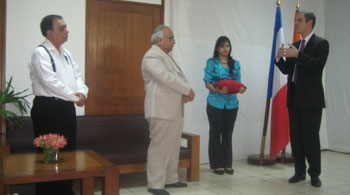 NEW DELHI, July 14: On the occasion of the French National Day, the Ambassador of France, Mr Jérôme Bonnafont, conferred top French honour of Officer in the Order of Palmes Académiques on Professors Mushirul Hasan and Vinay Kumar Tewari for their contributions in the educational field.
NEW DELHI, July 14: On the occasion of the French National Day, the Ambassador of France, Mr Jérôme Bonnafont, conferred top French honour of Officer in the Order of Palmes Académiques on Professors Mushirul Hasan and Vinay Kumar Tewari for their contributions in the educational field. 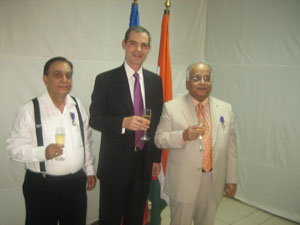 He is seeking to expand the collection of historical papers at the archives and recently appealed to private collectors for their collections.
He is seeking to expand the collection of historical papers at the archives and recently appealed to private collectors for their collections.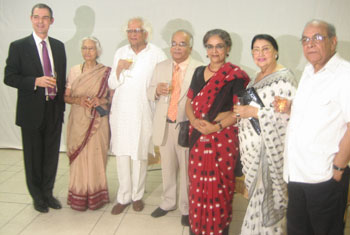 During his tenure as Vice-Chancellor, he actively promoted India-France academic exchanges, Jamia Millia Islamia signing several MoUs with French institutions.
During his tenure as Vice-Chancellor, he actively promoted India-France academic exchanges, Jamia Millia Islamia signing several MoUs with French institutions.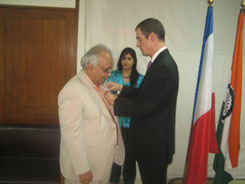
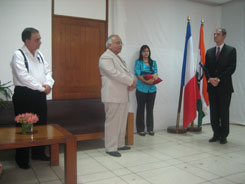
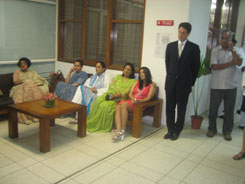
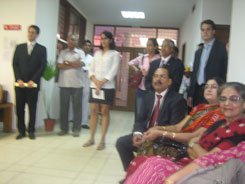
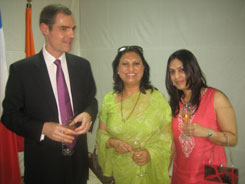
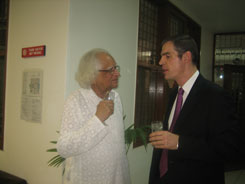
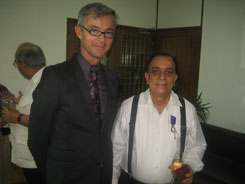
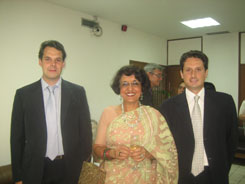
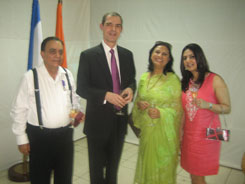
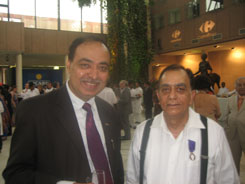

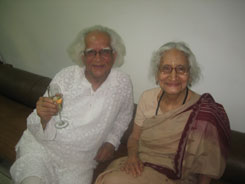
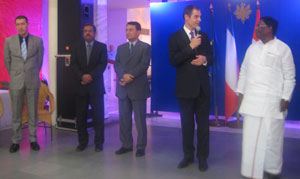 NEW DELHI: Later, the French Ambassador Jérôme Bonnafont hosted a reception to celebrate the French National Day that was attended by eminent politicians, diplomats, businessmen, theatre and fashion personalities and artists.
NEW DELHI: Later, the French Ambassador Jérôme Bonnafont hosted a reception to celebrate the French National Day that was attended by eminent politicians, diplomats, businessmen, theatre and fashion personalities and artists.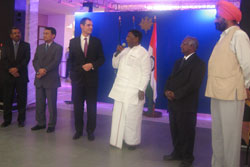
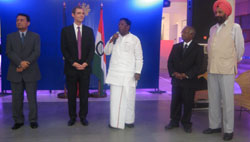
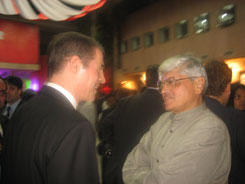
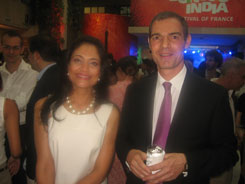
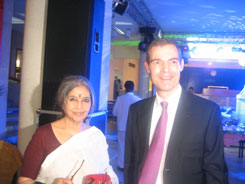
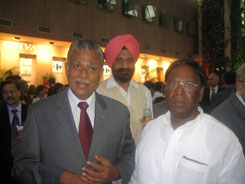
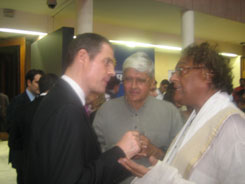
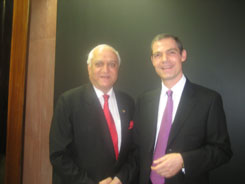
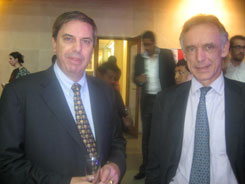
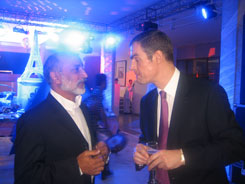
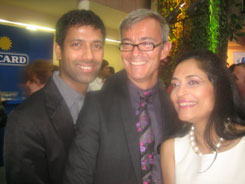
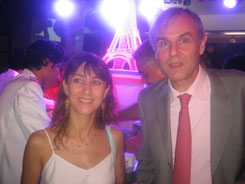
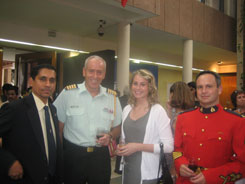
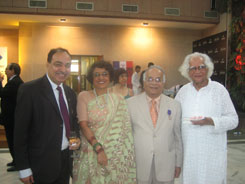
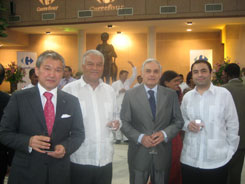
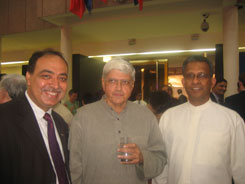
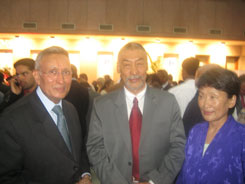
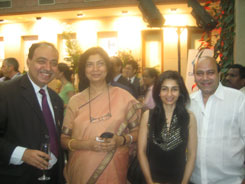
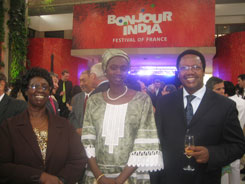
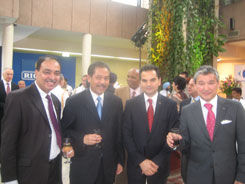
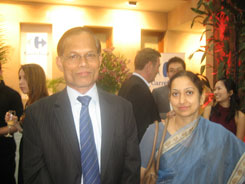
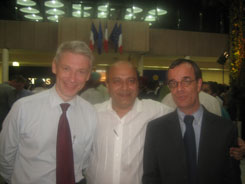
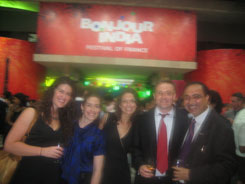
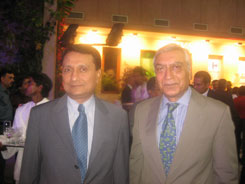
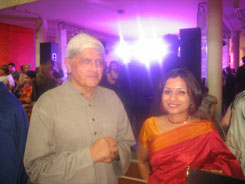
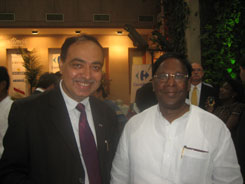
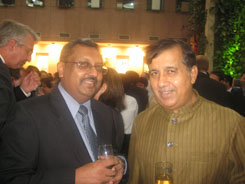
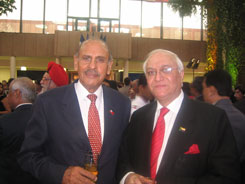
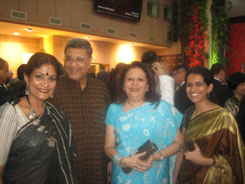
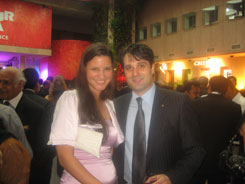

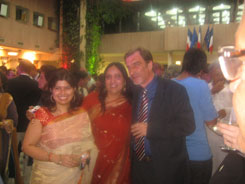
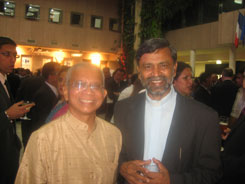
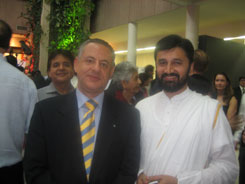
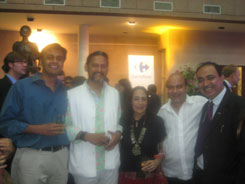
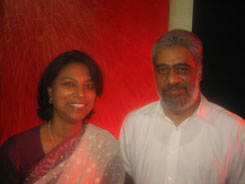
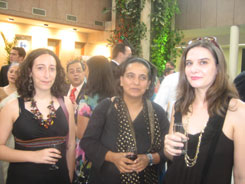
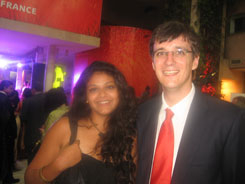
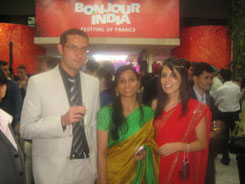
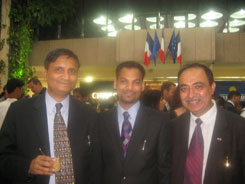
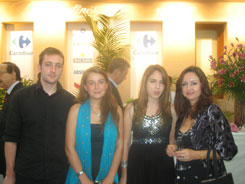
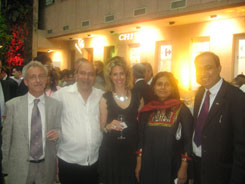
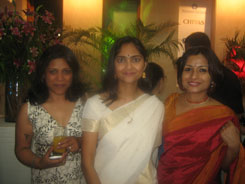
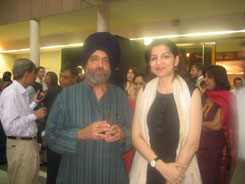
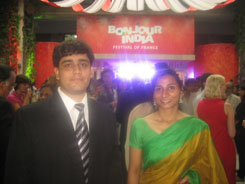
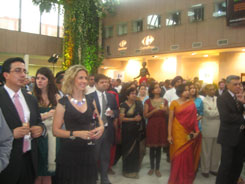
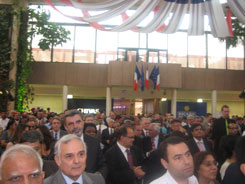
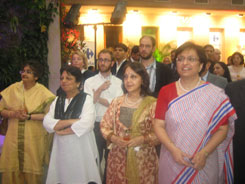
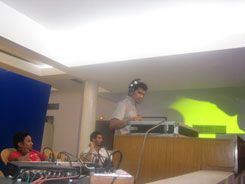
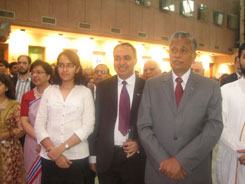
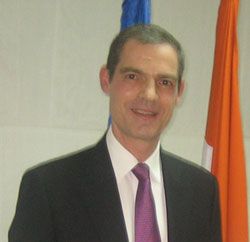 CHENNAI, July 13: France reiterated its support on Tuesday for India's bid for a permanent seat in the United Nations Security Council. The French ambassador in India Jerome Bonnafont said India, Brazil, Germany and Japan should be included as permanent members.
CHENNAI, July 13: France reiterated its support on Tuesday for India's bid for a permanent seat in the United Nations Security Council. The French ambassador in India Jerome Bonnafont said India, Brazil, Germany and Japan should be included as permanent members.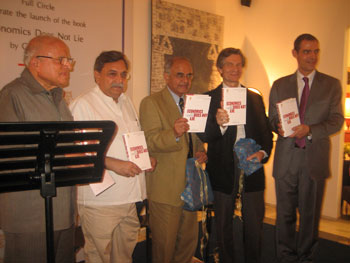 NEW DELHI, July 1: India is Number One in growth in the world and ahead of China if you take into account other parameters like personal freedom, democracy and liberty, according to Guy Sorman, a leading French intellectual and economist who champions the free market and democracy.
NEW DELHI, July 1: India is Number One in growth in the world and ahead of China if you take into account other parameters like personal freedom, democracy and liberty, according to Guy Sorman, a leading French intellectual and economist who champions the free market and democracy.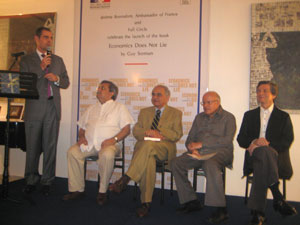 He said if one takes into account these other parameters, then the growth in India is much more sustainable than in China.
He said if one takes into account these other parameters, then the growth in India is much more sustainable than in China. 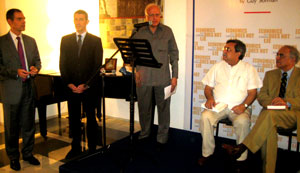 In “Economics Does Not Lie”, Sorman shows that behind this unprecedented growth there is not only the collapse of State Socialism but also a scientific revolution in economics -- one that is so far dimly understood by the public but increasingly embraced by policy makers around the world. He also reminds us that before this free-market revolution, bad economic policies ravaged entire nations during the twentieth century.
In “Economics Does Not Lie”, Sorman shows that behind this unprecedented growth there is not only the collapse of State Socialism but also a scientific revolution in economics -- one that is so far dimly understood by the public but increasingly embraced by policy makers around the world. He also reminds us that before this free-market revolution, bad economic policies ravaged entire nations during the twentieth century.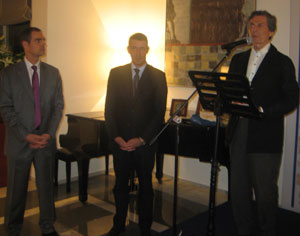 He said free market was not perfect but it needs constant fine tuning. In the same breath, he added there was no alternative to free market economy.
He said free market was not perfect but it needs constant fine tuning. In the same breath, he added there was no alternative to free market economy.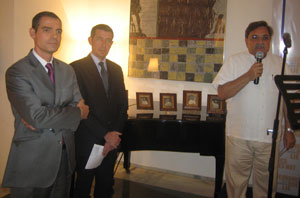 Recalling that bad economic policies ravaged entire nations during the 20th century, Sorman says that the way out of the crisis is, rather, to rebuild trust in the free-market society that has performed such miracles over the last thirty years.
Recalling that bad economic policies ravaged entire nations during the 20th century, Sorman says that the way out of the crisis is, rather, to rebuild trust in the free-market society that has performed such miracles over the last thirty years.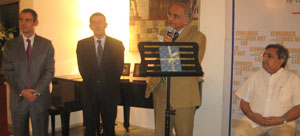 Responding to question on the economic crisis that the world faces, Sorman said “we are unable to predict the future – crisis or no crisis as it is based on innovations and in innovations everything does not work.”
Responding to question on the economic crisis that the world faces, Sorman said “we are unable to predict the future – crisis or no crisis as it is based on innovations and in innovations everything does not work.”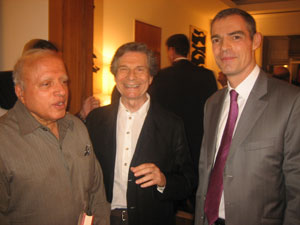 Soon after launching the book, Dr Swaminathan said that market economy was the most efficient of the systems where competition is usually desirable. Economy has undergone scientific revolution which integrates with ecology, equity and employment.
Soon after launching the book, Dr Swaminathan said that market economy was the most efficient of the systems where competition is usually desirable. Economy has undergone scientific revolution which integrates with ecology, equity and employment.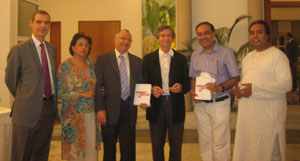 He said in this book Sorman writes an account of how market capitalism is lifting millions of people around the world out of poverty. This is not only happening because of the collapse of state socialism but also, as he points, because of a better understanding of economic ideas which have been increasingly embraced by policymakers around the globe.
He said in this book Sorman writes an account of how market capitalism is lifting millions of people around the world out of poverty. This is not only happening because of the collapse of state socialism but also, as he points, because of a better understanding of economic ideas which have been increasingly embraced by policymakers around the globe.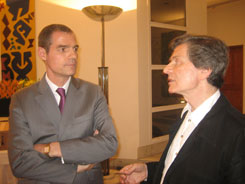
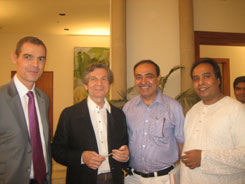
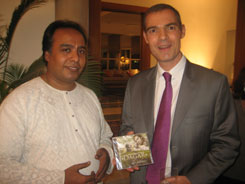
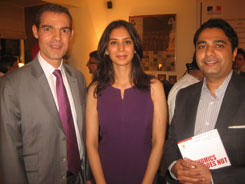
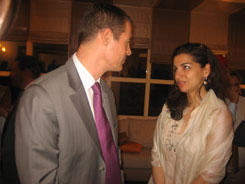
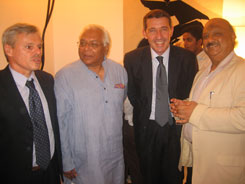
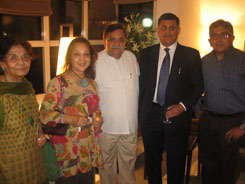
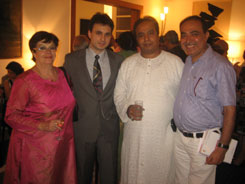
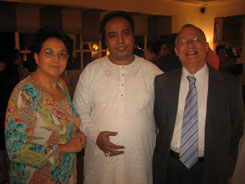
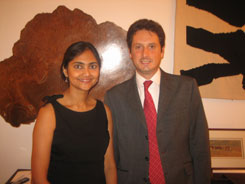
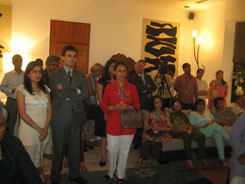
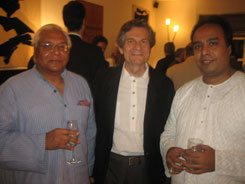
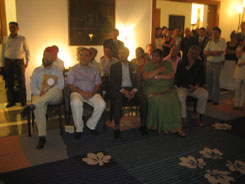
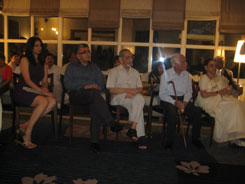
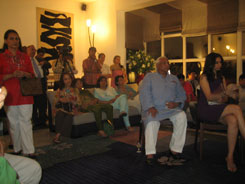
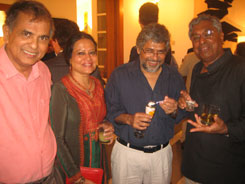
 NEW DELHI, June 23: India and the European Union (EU) exchanged notes on closer partnership in intelligence sharing and anti-piracy operations during EU High Representative for Foreign Affairs and Security Policy Catherine Ashton's two-day interaction with top policy makers here.
NEW DELHI, June 23: India and the European Union (EU) exchanged notes on closer partnership in intelligence sharing and anti-piracy operations during EU High Representative for Foreign Affairs and Security Policy Catherine Ashton's two-day interaction with top policy makers here.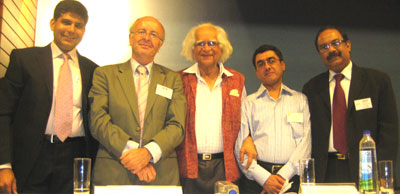 NEW DELHI, June 22: France has launched a dialogue with India on Corporate Social Responsibility. The visiting French Ambassador in charge of corporate Social Responsibility in the Ministry of Foreign and European Affairs, Michel Doucin, met his Indian counterparts here.
NEW DELHI, June 22: France has launched a dialogue with India on Corporate Social Responsibility. The visiting French Ambassador in charge of corporate Social Responsibility in the Ministry of Foreign and European Affairs, Michel Doucin, met his Indian counterparts here. Speaking at a seminar on “Corporate Social Responsibility – Emerging Trends in India and Europe” at the French embassy here, Ambassador Doucin emphasized that the Government has to be play greater role in CSR as an entrepreneur, buyer, investor, opinion leader, regulator, trigger and as legislator.
Speaking at a seminar on “Corporate Social Responsibility – Emerging Trends in India and Europe” at the French embassy here, Ambassador Doucin emphasized that the Government has to be play greater role in CSR as an entrepreneur, buyer, investor, opinion leader, regulator, trigger and as legislator. 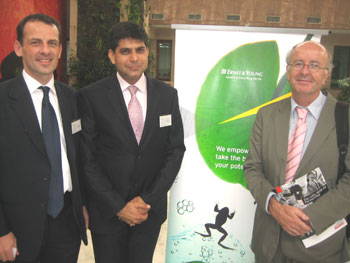 Ambassador Doucin said CSR is based on three principles: 1) Respect of Environment; 2) Respect of Social Rights; and 3) Transfer of Corporate Management to fulfill the first two pillars and to fight corruption and help sustain and flourish democracy.
Ambassador Doucin said CSR is based on three principles: 1) Respect of Environment; 2) Respect of Social Rights; and 3) Transfer of Corporate Management to fulfill the first two pillars and to fight corruption and help sustain and flourish democracy.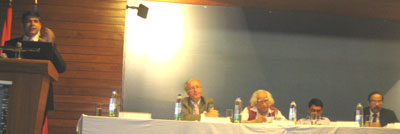 Soni said the past decade (2000 to 2010) saw companies moving from maximization of profits (focus on shareholders) to optimization of profits (focus on stakeholders), with recognition of the business case for CSR.
Soni said the past decade (2000 to 2010) saw companies moving from maximization of profits (focus on shareholders) to optimization of profits (focus on stakeholders), with recognition of the business case for CSR.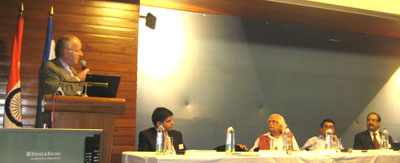 The Stage 3 is related to Sustainable Development and that is happening in Europe. It involves triple bottom-line, stakeholders’ involvement, linkages with development programmes, performance measurement and sustainability and value creation.
The Stage 3 is related to Sustainable Development and that is happening in Europe. It involves triple bottom-line, stakeholders’ involvement, linkages with development programmes, performance measurement and sustainability and value creation.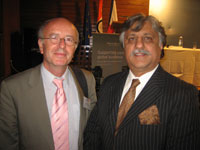 He said the companies must for path breaking technologies that help reducing pollution and enrich our environment.
He said the companies must for path breaking technologies that help reducing pollution and enrich our environment.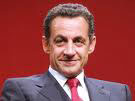 NEW DELHI, May 23: French President Nicolas Sarkozy on Sunday conveyed to Prime Minister Manmohan Singh his nation's "sincere condolences" on the death of 158 people in the Mangalore air crash.
NEW DELHI, May 23: French President Nicolas Sarkozy on Sunday conveyed to Prime Minister Manmohan Singh his nation's "sincere condolences" on the death of 158 people in the Mangalore air crash. 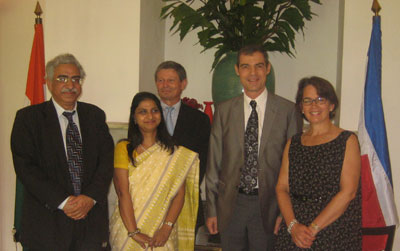 NEW DELHI, May 14: French aid agency AFD (Agence France de Developpement) will provide a 50 million-Euro loan to Small Industries Development Board of India (SIDBI) to promote energy saving investments in small industrial units and improve their energy efficiency.
NEW DELHI, May 14: French aid agency AFD (Agence France de Developpement) will provide a 50 million-Euro loan to Small Industries Development Board of India (SIDBI) to promote energy saving investments in small industrial units and improve their energy efficiency. 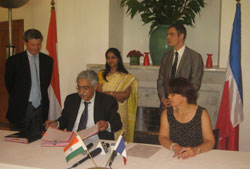 SIDBI Chairman and Managing Director R M Malla and AFD Director for Asia Martha Stein-Sochas signed the agreements in the presence of Ambassador of France to India Jérôme Bonnafont and Director for Europe, Department of Economic Affairs, Neeta Bhushan.
SIDBI Chairman and Managing Director R M Malla and AFD Director for Asia Martha Stein-Sochas signed the agreements in the presence of Ambassador of France to India Jérôme Bonnafont and Director for Europe, Department of Economic Affairs, Neeta Bhushan.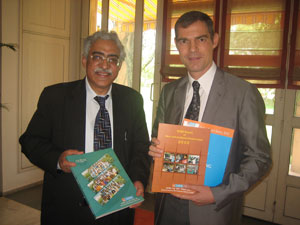 Ms Martha Stein-Sochas said "the 12-year credit line will allow SIDBI to finance energy efficiency and renewable energy investments by extending medium and long-term loans to micro, small and medium enterprises (MSME) either directly or through Prime Lending Institutions (PLIs).
Ms Martha Stein-Sochas said "the 12-year credit line will allow SIDBI to finance energy efficiency and renewable energy investments by extending medium and long-term loans to micro, small and medium enterprises (MSME) either directly or through Prime Lending Institutions (PLIs).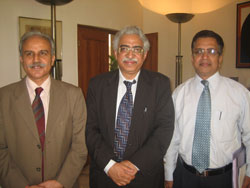 The Euro 0.5 million aims at supporting SIDBI, particularly its new energy efficiency cell, to develop its portfolio on energy efficiency and to stimulate demand for energy efficiency investments among MSMEs.
The Euro 0.5 million aims at supporting SIDBI, particularly its new energy efficiency cell, to develop its portfolio on energy efficiency and to stimulate demand for energy efficiency investments among MSMEs.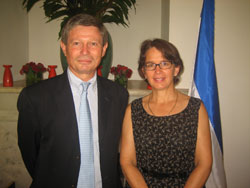 The credit line provided by AFD will indeed help reduce the fossil fuel energy consumption of the MSME sector while reinforcing its resilience to a new energy context, characterized by increasing energy prices and higher constraints on CO2 emissions.
The credit line provided by AFD will indeed help reduce the fossil fuel energy consumption of the MSME sector while reinforcing its resilience to a new energy context, characterized by increasing energy prices and higher constraints on CO2 emissions.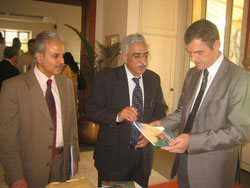 Ms Martha Stein-Sochas said AFD will soon sign another agreement worth 70 million Euros with the Indian Renewable Energy Development Agency (IREDA). She said AFD is also helping in the first phase of metro in Bangalore, a biodiversity project in Assam and improving water system in Jodhpur.
Ms Martha Stein-Sochas said AFD will soon sign another agreement worth 70 million Euros with the Indian Renewable Energy Development Agency (IREDA). She said AFD is also helping in the first phase of metro in Bangalore, a biodiversity project in Assam and improving water system in Jodhpur.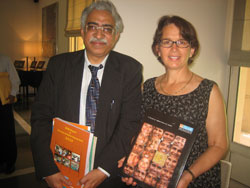 Mr Malla said SIDBI enjoys triple A (AAA) rating from CRISIL and CARE and has been raising its resources from both domestic market as well as international agencies like IFAD, KfW, JICA, ADB and World Bank.
Mr Malla said SIDBI enjoys triple A (AAA) rating from CRISIL and CARE and has been raising its resources from both domestic market as well as international agencies like IFAD, KfW, JICA, ADB and World Bank.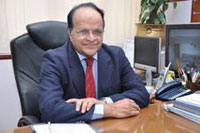 NEW DELHI, May 2: Indira Gandhi National Open University (IGNOU) has launched its latest programme of learning French via Hindi through distance education. Developed with the support and collaboration of the Embassy of France, the programme will enable all the students who wish to learn the language but are far from the network of the Alliances Françaises.
NEW DELHI, May 2: Indira Gandhi National Open University (IGNOU) has launched its latest programme of learning French via Hindi through distance education. Developed with the support and collaboration of the Embassy of France, the programme will enable all the students who wish to learn the language but are far from the network of the Alliances Françaises. The programme was launched by the Ambassador of France Jerôme Bonnafont and IGNOU Vice Chancellor V N Rajasekharan Pillai.
The programme was launched by the Ambassador of France Jerôme Bonnafont and IGNOU Vice Chancellor V N Rajasekharan Pillai. 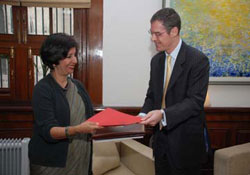 NEW DELHI: The Indo-French agreement on the development of peaceful uses of nuclear energy enters into force from January 14, giving a new impetus to the bilateral partnership envisaging multiform civil nuclear cooperation and paving way for companies to build atomic power plants in India.
NEW DELHI: The Indo-French agreement on the development of peaceful uses of nuclear energy enters into force from January 14, giving a new impetus to the bilateral partnership envisaging multiform civil nuclear cooperation and paving way for companies to build atomic power plants in India.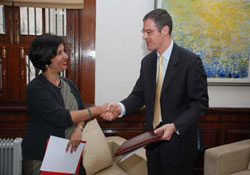 "As responsible States with advanced nuclear technologies, France and India intend to develop a multiform civil nuclear cooperation covering a wide range of activities including nuclear power projects, R&D, nuclear safety, education and training," the statement said.
"As responsible States with advanced nuclear technologies, France and India intend to develop a multiform civil nuclear cooperation covering a wide range of activities including nuclear power projects, R&D, nuclear safety, education and training," the statement said. 
